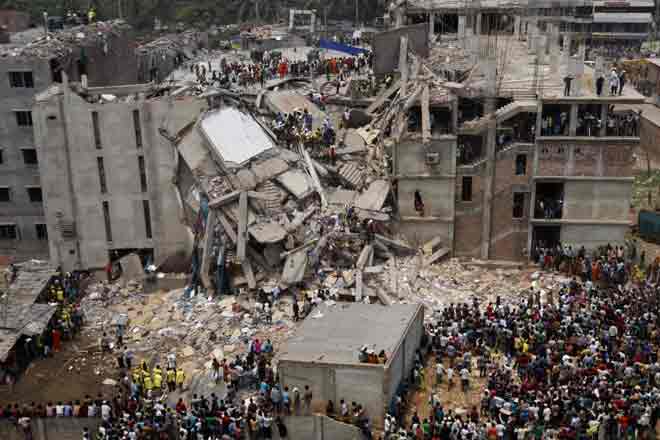
Dhaka, Bangladesh (BBN)-Loblaw and Joe Fresh say a $2-billion class action lawsuit that a Toronto law firm is attempting to bring against them over Bangladesh’s Rana Plaza collapse is "without merit," and say they will defend themselves against it.
On Thursday, Toronto law firm Rochon Genova LLP launched a lawsuit against the company and others, seeking $2 billion in damages on behalf of garment workers who survived the collapse of the Rana Plaza garment factory in Bangladesh, and the families and estates of those who did not, reports CBC News.
A series of co-ordinated, proposed class-action lawsuits have been filed in Canada, the United States and Italy around the April 24 second anniversary of the disaster, which claimed the lives of 1,129 garment workers and injured thousands more, reports thestar.com.
Most of the garment workers were women working long hours and earning less than $1 a day while sewing fashionable clothes for some of the world’s biggest labels.
Firms who sourced clothing from garment factories housed in the eight-storey Rana building include The Children’s Place, Loblaw’s Joe Fresh and Benetton.
While a Toronto law firm filed the notice of action against Loblaw in Canada, in Washington, D.C., a similar intended suit was filed against J.C. Penney, The Children’s Place and Walmart.
In both countries, in order for a class action to proceed it must first be certified by the courts.
The statement of claim alleges Canadian grocery giant Loblaw knew before the collapse that Bangladesh factories had "an extremely poor record" of workplace safety standards and industrial building standards.
It also alleges that Loblaw was aware there was a "significant and specific risk" to workers who manufactured Joe Fresh garments and who were employed by their subcontractors in Bangladesh.
Joe Fresh is just one of the many clothing designers who had merchandise being made at the facility via subcontracting.
"We believe that this claim is without merit and intend to vigorously defend our position," Kevin Groh, a spokesperson for Loblaw Companies Limited told CBC News.
Groh, vice-president of corporate affairs at Loblaw Companies Ltd, said he hoped “this claim does not distract from the positive work Loblaw has done and continues to do in respect of this tragedy — and that it does not discourage others from making similar contributions.”
He noted Loblaw is working to improve working standards in Bangladesh and has already directed $5 million to voluntary relief related to Rana Plaza.
“We became an early signatory — and the only Canadian company — committing to membership in the Accord for Fire and Building Safety in Bangladesh, which introduces standards and audits related to the structural integrity of factories,” he added.
In the Washington claim, the amount being sought has been left open, intended to be determined by the court, said pursuing lawyer Jonathan Greenbaum.
The notice of action against Loblaw and Joe Fresh was filed on behalf of three garment workers — Arati Rani Das, a 19-year-old who lost a leg in the collapse, Rehana Khatun, a 20-year-old who lost both of her legs, and Mohammed Alauddin — and a representative for family members of victims, Kashem Ali.
They are represented by the Toronto class action law firm Rochon Genova LLP.
The suit seeks damages for wrongful death and injury of $1.85 billion plus punitive damages of another $150 million.
It alleges Loblaw was aware there was a “significant and specific risk” to workers who made Joe Fresh clothing employed by New Wave, a garment company at Rana.
The Toronto notice of action, filed on April 22 in the Ontario Superior Court of Justice, also names Bureau Veritas, the company the suit alleges performed inspections and audits of textile garment factories on behalf of Loblaw, saying it was their job to report to Loblaw any concerns they found.
Big brands and retailers should share liability with their suppliers because they have influence over their factories, says Bob Jeffcott, a worker’s rights advocate with the Maquila Solidarity Network.
The organisation is not involved with any suit.
Companies from across the globe went to Bangladesh to manufacture their fast fashions because they knew the country had lax labour laws and enormous pools of cheap workers. Clothing companies were able to put orders and get a quick turn around time.
Some garment makers who couldn't fulfil their contracts used subcontractors.
Before Rana collapsed, on April 23 inspectors did notice cracks in the buildings structure and employees were evacuated but then sent back to work, the notice said.
Rana was originally constructed for retail shops only but illegally constructed floors were added to the structure without the proper permits.
The first and second floors contained a bank, apartments and several shops while the remaining five floors housed garment factories and heavy machinery including diesel generators, the suit said.
“You’d think that when companies sent auditing firms to the buildings they’d notice it was eight storeys and not built for garment machinery. Do they or don’t they report that to the company? That is a good question,” Jeffcott said.
“This tests, absolutely, if the companies have done their due diligence,” he added.
Since class actions can take years to resolve, Jeffcott said he hoped the big brands would still contribute to the Rana Plaza Donor’s Trust Fund.
About $2.7 million is needed out of the $30 million target to help care for those in need. On the second Rana anniversary, The Children’s Place donated $2 million and Benetton $1.1 million.